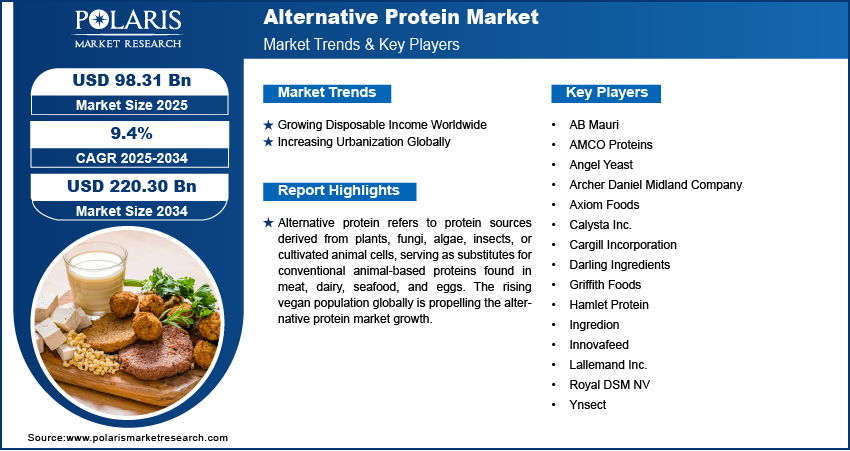The Rise of Clean Meat and Plant-Based Alternatives

The global alternative protein market size was valued at USD 90.04 billion in 2024. The industry is projected to grow from USD 98.31 billion in 2025 to USD 220.30 billion by 2034, exhibiting a CAGR of 9.4% during 2025–2034.
Market Overview
Alternative proteins encompass a range of non-animal-derived protein sources, including plant-based proteins, insect proteins, cultured meat, and fermented proteins. These alternatives are gaining traction due to concerns over environmental sustainability, animal welfare, and health implications associated with traditional animal-based proteins. Consumers are increasingly seeking protein-rich foods that align with their values and dietary preferences, driving the demand for innovative protein solutions.
Market Segmentation
By Source:
- Plant-Based Proteins: Derived from plants such as soy, peas, lentils, and chickpeas, these proteins are widely used in meat substitutes, dairy alternatives, and protein supplements.
- Insect Proteins: Sourced from insects like crickets and mealworms, insect proteins are rich in essential amino acids and are gaining popularity in regions with a history of entomophagy.
- Cultured Meat: Also known as lab-grown meat, this involves cultivating animal cells in a controlled environment to produce meat without raising and slaughtering animals.
- Fermented Proteins: Produced through fermentation processes using microorganisms, these proteins are utilized in various food products and are known for their high nutritional value.
By Application:
- Food & Beverages: The largest segment, encompassing meat substitutes, dairy alternatives, protein supplements, and ready-to-eat meals.
- Animal Feed: Alternative proteins are increasingly being incorporated into animal feed to reduce reliance on traditional feed sources and enhance sustainability.
- Cosmetics & Personal Care: Proteins derived from alternative sources are used in skincare and haircare products for their nourishing properties.
By End-User:
- Individual Consumers: Driven by health, ethical, and environmental considerations, individuals are adopting alternative proteins in their diets.
- Food Manufacturers: Companies are incorporating alternative proteins into their product lines to meet consumer demand and align with sustainability goals.
- Researchers & Developers: Focused on innovating and improving alternative protein sources through technological advancements.
Regional Analysis
North America:
North America leads the alternative protein market, with the United States and Canada at the forefront. The region's strong consumer base, coupled with increasing awareness of health and environmental issues, has spurred the demand for alternative proteins. The presence of established food manufacturers and a supportive regulatory environment further bolster market growth.
Europe:
Europe is witnessing significant growth in the alternative protein sector, driven by countries like Germany, the United Kingdom, and France. The European Union's commitment to sustainability and reducing greenhouse gas emissions has led to policies encouraging the adoption of alternative proteins. Consumer demand for plant-based products is rising, with Germany reporting plant-based food sales worth €1.9 billion in 2022, marking an 11% increase from the previous year .
Read More @ https://www.polarismarketresearch.com/industry-analysis/protein-alternatives-market
Asia-Pacific:
The Asia-Pacific region is experiencing rapid growth in the alternative protein market, fueled by countries such as China, Japan, and India. Traditional plant-based diets in these countries are being complemented by modern dietary trends, leading to increased consumption of alternative proteins. Additionally, rising disposable incomes and urbanization contribute to the market's expansion .
Latin America:
Latin America shows moderate growth potential, with countries like Brazil and Mexico exploring alternative protein sources. Economic constraints and a young, tech-savvy population are driving the demand for affordable and flexible protein solutions. However, challenges such as limited infrastructure and regulatory hurdles may impact market growth.
Middle East & Africa:
The Middle East & Africa region presents a mixed landscape for the alternative protein market. While countries like the United Arab Emirates and South Africa are adopting alternative proteins in sectors like food and cosmetics, challenges such as regulatory hurdles and limited internet penetration in certain areas hinder widespread adoption. However, ongoing infrastructural developments and digital initiatives are expected to bolster the market in the coming years.
Key Companies
Several companies are at the forefront of the alternative protein market, offering innovative products and solutions:
- Company A: Specializes in plant-based meat substitutes, providing a range of products that mimic the taste and texture of traditional meats.
- Company B: Focuses on cultured meat technology, aiming to produce sustainable and ethical meat alternatives through cellular agriculture.
- Company C: Develops insect-based protein products, catering to markets with a history of entomophagy and seeking sustainable protein sources.
- Company D: Utilizes fermentation processes to produce high-quality proteins for various applications, including food, beverages, and personal care products.
These companies are leveraging technological advancements and consumer insights to drive innovation in the alternative protein sector.
Conclusion
The alternative protein market is poised for significant growth, driven by consumer demand for sustainable, ethical, and health-conscious food choices. As technological advancements continue to improve the production and accessibility of alternative proteins, the market is expected to expand across regions. Companies operating in this space must focus on innovation, quality, and consumer education to capitalize on the opportunities presented by this evolving market.
More Trending Latest Reports By Polaris Market Research:
- Art
- Causes
- Crafts
- Dance
- Drinks
- Film
- Fitness
- Food
- Jogos
- Gardening
- Health
- Início
- Literature
- Music
- Networking
- Outro
- Party
- Religion
- Shopping
- Sports
- Theater
- Wellness
- Travels

